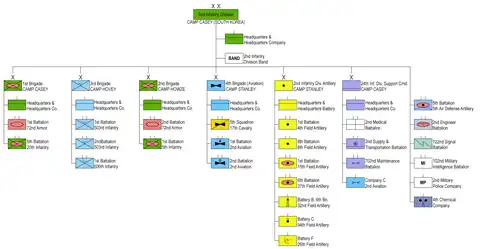Camp Howze, South Korea
Camp Howze was a United States Army post in Bongilchon, South Korea, until it was deactivated and turned over to the South Korean Army in 2005.
History

Originally a US Marine Corps—divisional level—command post (1953–1955) for the 1st Marine Division.[1]
In 1955, when the Marines departed Korea, the 24th Infantry Division of the US Army placed their headquarters on the site. In 1957 the camp became the division headquarters for the 1st Cavalry Division,[2] which in 1960 named the camp after Major General Howze, who had organized and trained the division from 1921 to 1925.[3][4][5]
In 1971 it became the headquarters for the 3rd Infantry Brigade of the 2nd Infantry Division. "The 3rd Brigade was responsible for the security of the United Nations delegation at Panmunjom and for the security of the American sector of the Demilitarized Zone. On 1 October 1992, the 3rd Brigade was officially inactivated and the Engineer Brigade, 2nd Infantry Division placed their headquarters at Camp Howze."[6][7]
At the time of its deactivation in 2005, Camp Howze was the home of the Headquarters and Headquarters Detachment (HHD), Engineer Brigade, Second Infantry Division and the 44th Engineer Battalion. However the 44th had participated in the deployment of the 2nd Brigade Combat Team, Second Infantry Division, in August 2004, in support of Operation Iraqi Freedom and was subsequently redeployed to Fort Carson, Colorado, and did not return to Camp Howze.
On 12 September 2018 a dedication ceremony was held for the Omma Poom park, which was constructed on the site of the former Camp Howze.[8]
Camp garrisons
It was a garrison for the 1st Battalion of the 31st Infantry Regiment,[lower-alpha 1] which was "reflagged" (i.e. redesignated) as the 1st Battalion of the 5th Infantry Regiment in 1987.[9][10]
Location
37°44′47.4″N 126°49′18.9″E The site of Camp Howze originated with the 1st Marine Division's establishment of a command post at Tonggu.[11][lower-alpha 2]
Camp Howze spanned three ri administrative districts located in Jori-eup, which is a sub-administrative district of Paju-si, Gyeonggi-do:
- Front gate: Bongilcheon-ri (봉일천리)
- Noejo-ri (뇌조리)
- Janggok-ri (장곡리)
In popular culture
Camp Howze was featured in Larry Bond's Red Phoenix,[13] a 1989 techno thriller.[14]
External links
- Google. "Bongilcheon-ri" (Map). Google Maps. Google.
- Google. "Noejo-ri" (Map). Google Maps. Google.
- Google. "Janggok-ri" (Map). Google Maps. Google.
- "Korea Map". rickinbham.tripod.com. Image of a military topographic map that notes the location of Camp Howze.
- "Korea 1956: Camp Howze". Xenophon Group International. Image of the 24th Infantry Division's headquarters (later named Camp Howze).
- "Division Headquarters 1965-66". Second Indianhead Division Association. Image of Camp Howze.
Notes
- With the exception of B Company which was garrisoned at Camp Edwards in a separate compound on the east side of National Route 1—hence, "Camp Edwards East"—with "Camp Edwards West" being Camp Edwards proper.
- Additionally noted in Chinese: 同 囗 (Tóng wéi) on the Map of Korea, AMS Series L751.[12]
References
- "Korean War Memorials in Pictures: Remembering UN Participation 60 Years Later" (PDF). "[Per Marines (US and ROK)] The Monument for the Participation . . . in the Korean War was built in Bongilcheon-ri, a site that was fiercely contested..." —(p. 89)
- "1st Cavalry Division History - Demilitarized Zone, 1957 - 1965". first-team.us. Archived from the original on 30 December 2009.
[I]n ceremonies held in [Camp Howze (later named)] Tonggu, Korea, the colors of the 24th Infantry Division were retired and the colors of the 1st Cavalry Division were passed to the Commanding General of the former 24th Infantry Division...
- "Robert Lee Howze". cemetery.tspb.texas.gov.
- Park Kyung-man (7 October 2019). "15 years after Camp Howze's departure, Bongilcheon No. 4 Village in ruins". english.hani.co.kr. The Hankyoreh.
The name "Camp Howze" was assigned in 1960 by the US 1st Infantry headquarters after its inaugural commander.
NB: Park Kyung-man likely meant "1st Cavalry" rather than "1st Infantry" - "A Profile of USFK's Western Corridor Camps". ROK Drop. 12 January 2010. Retrieved 13 January 2021.
[Per Camp Howze] the camp was taken over by the 24th Infantry Division from 1955–1957. . . . In 1957 the camp was transferred over to the 1st Cavalry Division . . . [which] used the camp as its division headquarters. In 1965 the 1st Cavalry Division units in South Korea were redesignated [as units of] the 2nd Infantry Division, which continued to use the camp as a division headquarters. The 2nd Infantry Division headquarters would move to Camp Casey in 1971...
- "Camp Howze". globalsecurity.org.
- "Engineer Brigade, 2nd Infantry Division". globalsecurity.org.
[Per the Engineer Brigade, 2nd Infantry Division] The Brigade consisted of a Headquarters and Headquarters Detachment, the 2nd Engineer Battalion and the 44th Engineer Battalion. Corps assets attached to the Brigade included the 50th Engineer Company (Assault Float Brigade) and the 82nd Engineer Company (Combat Support Equipment). Korean augmentation included the 3rd and 7th Korean Service Corps Companies.
- "Park dedicated to adoptees opens on former US military base in South Korea". Stars and Stripes.
- "5th Regiment History". 5th INFANTRY REGIMENT ASSOCIATION.
- "1st Battalion, 5th Infantry Regiment | Lineage and Honors | U.S. Army Center of Military History (CMH)". history.army.mil.
- "File 2828: 1st Marine Regiment - Headquarters Battalion - Command Diary". koreanwar.org. December 1953. Retrieved 9 January 2021.
Headquarters—Headquarters Battalion—1st Marine Division (Reinf), FMF—c/o FPO, San Francisco, California—COMMAND DIARY FOR DECEMBER 1953—Map of Korea, AMS Series L751, L: 50,000—1. SUMMARY—This report covers the activities of Headquarters Battalion from 1 December to 31 December 1953 . . . the Division Command Post was located at TONGGU, Korea (CS083788), and operated thereat.
- "Koyang ; Sheet 6527 II | A.M.S. (Series) ; L751". Digital Archive @ McMaster University Library.
Compiled in 1953 from Korea, 1:25,000, AMS (AFFE), Sheets 6725 II NE, SE, SW, NW, 1951. A.M.S. (Series) ; L751. "Edition 9-AMS (AFFE)".
- Bond, Larry (1989). Red phoenix. Macdonald. ISBN 9780356179742.
- Robson, Seth (19 October 2004). "As Camp Howze closing nears, many historical items are being preserved". Stars and Stripes. Retrieved 1 January 2021.